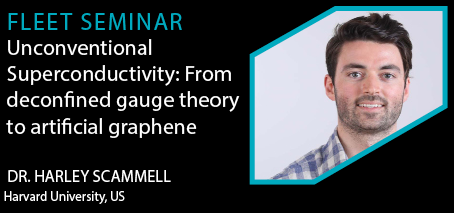-
29 Jul 2019
11:00 am - 12:00 pm
Unconventional Superconductivity: From deconfined gauge theory to artificial graphene
Dr. Harley Scammell, Harvard University, US
All welcome! The seminar flyer can be downloaded clicking on this link
Abstract:
Unconventional superconductivity, which relies on non-phonon mediated pairing, typically emerges from nearby strongly correlated magnetic phases. However, the interplay between superconductivity and magnetism greatly complicates the theoretical description.
In this talk, we will discuss the interplay of superconductivity and magnetism in two distinct settings. (i) First, a description will be given on how concepts from deconfined gauge theory can be applied to help understand the correlated phases observed in high-temperature (cuprate) superconductors. (ii) Then, turning to artificial graphene – a system in which the complications due to correlated magnetism can be mostly avoided – a new microscopic mechanism of unconventional superconductivity will be presented.
BIO:
Dr. Harley Scammell worked as a postdoctoral researcher with Prof Oleg Sushkov at UNSW on the theory of artificial graphene in FLEET’s Research Theme 1, topological materials. Harley was awarded a 2018 Fulbright Postdoctoral Scholarship and has since been working with Professor Subir Sachdev in the Condensed Matter Theory Group at Harvard University.
Dr. Scammell’s research has focused on the theory of emergent quantum phase of matter. In particular, he has been researching systems and states of matter with desirable properties for information technology (topological transistors, superconductors). He has also been exploring the physics of deconfined gauge theories, and how these ideas can be applied to tame the complexity of quantum many-body systems.
Venue: G59-G60, Old Main Building K15
Address:

